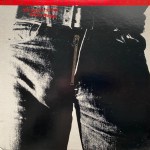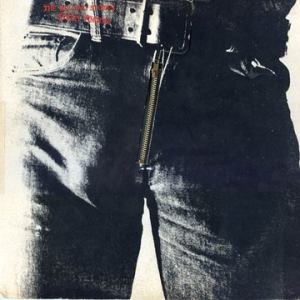 More of the Music of The Rolling Stones
More of the Music of The Rolling Stones
More Helpful Advice on Doing Your Own Shootouts
Robert Brook wrote to me recently with some questions.
Hi Tom,
I read your recent post about Sticky Fingers and the European TML reissues you included in shootouts.
It raised a question for me that I’ve been wanting to ask you for a while now.
The fact that the UK TML earned an A+ to A++ grade and that, with just a one copy sample, you wouldn’t consider that pressing to have shootout winning potential, suggests to me that the US pressings you favor will grade at A++ or higher.
In other words, if you put a shootout together of [redacted stamper] pressings and whatever else you like, does every copy in the shootout grade at least A++ / A++? Are the right stampers that reliable?
I guess I’ve always assumed that even if you put together a shootout with this or any other title, and even if you only include pressings that have won or placed high in the past, at least a couple of them would end up graded no higher than A+ or A+ to A++.
And if that is correct, wouldn’t it be worth buying more UK TML’s to see if any emerge that could win a shootout?
With Revolver, for instance, why not just do shootouts with [redacted numbers] if those are the ones that win the shootouts? Why even bother with [later pressings]?
Robert,
All good questions! I could go on for days with this kind of inside baseball stuff. I’ve been living it full time for more than twenty years, and it obviously interests you because you are actually trying to hone your shootout skills and figure out how many of what pressings you need to get one going, etc., etc.
Not many others are doing what you are doing in a serious way, so how helpful anyone will find this information is hard to know. Under the circumstances, I should have kept my answers shorter rather than longer but I could not resist going into more detail than might have been advisable. Feel free to skim if you like.
Why not put more TML pressings into shootouts?
If they had pressed plenty of them and they’d ended up sitting in record bins all over town for twenty bucks a pop, we could get a bunch in and see if we could figure which stampers, if any, are able to reach the Super Hot stamper level.
Instead, they are expensive imports that cost as much or more than the copies that we buy with shootout winning stampers. Some audiophiles mistakenly think that they are much better sounding than we they actually are, an error in judgment which has a number of knock-on effects.
One, it raises the prices for these pressings far beyond what they would otherwise be if only these individuals were able to clean and play them the way we do.
The best early domestic pressings of the album are night and day better sounding.
If you think The Mastering Lab pressings are competitive with the right originals, you could not possibly have heard one of our shootout winning pressings. There is no contest. Why would we waste any money on them?
Two, we don’t carry water for these audiophile record reviewers. They think they know a lot more than they do. They clearly have no idea how to do the work that it takes to find the best sounding pressings.
We do not respect the opinions of those who have little understanding of records and their pressing variations. The faulty conclusions they invariably arrrive at lack evidentiary support because they don’t know how to do what we do and can’t be bothered to learn.
Amazing Originals
Regardless of what these folks believe, by now we’ve heard dozens and dozens of amazing originals. This made us extremely skeptical that any other mastering house could compete with the right original’s sound. It was just too good.
We’re not always correct about these things. We were dead wrong about a couple of famous Pink Floyd albums from the “wrong” country that we’d heard good things about. They have been winning shootouts for many years now. Live and learn.
In this case we simply did our due diligence. We got a couple of candidates in, cleaned them up and played them, so that we could know what we were talking about, with evidence to back up what we say. Beyond that we quickly lost interest.
And, finally, shootouts are tedious and difficult. They require a great deal of mental concentration, which quickly becomes fatiguing and is often frustrating.
However, great sounding records are a positive thrill to play. The more potentially great sounding copies there are in a shootout, the more fun that shootout is likely to be.
Playing too many mediocre copies bogs down and drags out the proceedings, and the TML pressings of Sticky Fingers are not much better than mediocre. They may impress some audiophiles — this is not hard to do, audiophiles in general seem to us much too easily impressed — but after playing scores of copies over the last twenty years, we’re pretty sure we know Sticky Fingers about as well as anyone can know it.
The Evolution of Generalities
The right stampers on the right UK Island labels always win the shootouts for our two most popular Cat Stevens titles, Tea for the Tillerman and Teaser and the Firecat.
Although the domestic copies are cut by Lee Hulko, on the same lathe, from the same tape, they may do well, but they never win shootouts up against the best UK pressings.
In 2006 we had an incomplete understanding of the album. We didn’t know it at the time, but we still had a lot more R&D to do. Dozens of shootouts later, using blind testing, the exact same stampers win each and every shootout we do.
If using scientific methods gives you predictable results, you must be on to something that is fundamentally true of reality.
For this reason, we don’t do shootouts for these two titles until we have acquired a preponderance of clean UK copies with the right stampers. Sure, we put other pressings in the shootout to fill out the numbers, but we must have a sufficient number of pressings with shootout winning potential, and not too many of those without it, before we would want to get a shootout going.
One Stamper Rule
There are scores of records that we play that have one specific set of stampers that always win.
Fragile is one. We cannot do the shootout for Fragile until we find enough clean copies with precisely the right stampers. (And no, they’re not A. If you think they’re A, you have never bought one of White Hot shootout winners. They are never A.)
There was a three year period (2017 to 2020) in which we didn’t do a shootout for Deja Vu because we simply could not find enough copies in clean condition with the right stampers. Knowing the right stampers doesn’t do you any good if you can’t track them down.
Kind of Blue is a shootout we would never do without a least a few clean 6-Eye Stereo pressings, as well as some 360s and the one stamper on the 70s Red Label that we like (which is the hardest of all of them to find). We don’t do Kind of Blue nearly as often as we would like because none of the pressings we need for our shootouts is all that common in audiophile playing condition.
Our last shootout for John Barleycorn took place in 2019. We finally managed to do it again just this week. Yes, it takes four years to find enough of the right stampers to do some titles, Barleycorn among them.
Do the right stampers always get good grades?
(more…)


 More of the Music of The Rolling Stones
More of the Music of The Rolling Stones

 More of the Music of The Rolling Stones
More of the Music of The Rolling Stones



 Sway
Sway


 That shootout turned out to be a bust. Without the Walker record cleaning fluids and a number of dramatic improvements we made to our front end in the ensuing years, the copies of Sticky Fingers we had on hand back then were just too noisy, and many of them were very crude sounding.
That shootout turned out to be a bust. Without the Walker record cleaning fluids and a number of dramatic improvements we made to our front end in the ensuing years, the copies of Sticky Fingers we had on hand back then were just too noisy, and many of them were very crude sounding.